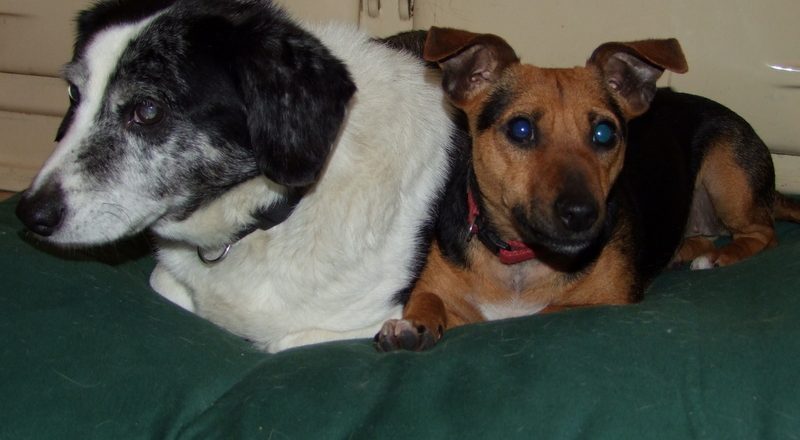
My two dogs, Spot (who died of old age last year) and Kiko, used to be friends, but they sometimes disagreed over toys or food. Dog fights are a serious issue: they can result in traumatic injuries on the one side, and life-changing consequences on the other side for the dog perceived as the “attacking animal”.
Why do dogs fight?
Dogs fight for many different reasons, and it can be difficult for onlooking humans to judge why. Possible causes include:
- Competition over resources (territory, people, food, toys)
- Genetic desire to fight (some terriers)
- Incompatability (some dogs just don’t get on together)
- Fear of being attacked
There are two main situations where fighting may happen and each needs a different approach.
- Dogs sharing a home together
- Dogs who are strangers, meeting out on walks
In both cases, it’s far better to manage dogs carefully to avoid fights: once a dog has experienced fights, it can be difficult to stop them recurring, because fighting can become a learned response to certain situations. If a dog starts to exhibit aggression to other dogs, professional behavioural advice should be sought, so that the problem can be nipped in the bud if possible.
Hormones have an effect: male dogs are more likely to be aggressive to other dogs than neutered dogs, and a bitch in season adds a note of tension to the dog social scene that can make fighting more likely.
It’s important to realise that dog-dog aggression is different from dog-human aggression. Just because a dog is aggressive to other dogs, this does not mean that the animal is a risk to people.
Dogs sharing a home together
Young dogs often get on well together, but as they mature, incompatabilities can develop – this can happen whether dogs are related or unrelated. Animals do not have family loyalties or ties like humans. In the wild, if dogs stop being compatible as they mature, one of them leaves to join or form a new pack. Pet dogs cannot leave in this way, so it’s up to owners to manage them to ensure that they are not forced to live with ongoing conflict.
Littermates often start to fight as they mature, because they tend to have similar physique and temperament: there is no clear winner in conflicts, so they tend to continue indefinitely, until one dog is rehomed elsewhere.
Preventing fighting in the home
Owners should learn to manage situations that are likely to provoke conflict between dogs sharing a home.
- Dogs may need to be fed in separate rooms
- Favourite toys should only be given to a dog when on their own
- When visitors arrive, dogs may need to be separated
- Any time when excitement is high, dogs may need to be separated (eg parties, sports on tv, etc)
- A dog should be allowed to be left in peace in its favourite bed area
Dogs out on walks
When unfamiliar dogs get into social situations with each other, fighting is a possible consequence. The safest answer can be to avoid letting your dog interact with others at all, by keeping up the focus on you or a toy/treat that you’re carrying.
At the same time, dogs can have great fun together. You need to choose playmates with care, and stop the dogs playing before they get too tired (like humans, they can get more grumpy, and more likely to fight, when tired). Dogs do not need a busy social life, and you should only let your dog play with others in a dog park if they enjoy playing. If they have a history of aggressive episodes, avoid the dog park.
You should manage your dog’s social experiences from puppyhood onwards. If your dog ever has a frightening experience with other dogs, this can lead to fear of other dogs, which can lead to pre-emptive aggressive behaviour, and this can lead to fighting. If dogs can be protected from bad experiences with other dogs, they tend to be more confident, and less prone to getting into conflict with other dogs.
Preventing fighting out on walks
- Avoid situations that are likely to lead to conflict
- Train your dog well so that off-leash recall is strong and reliable
- If in doubt, dogs should be kept on the leash at all times in public
- Use treats/toys to distract your dog when others are around
- Only let your dog play with dogs that are known not to be aggressive
- If in doubt, keep your dog away from other dogs
- If fights are prevented, your dog is less likely to learn to be aggressive
Stopping dog fights
Preventing fights is the best answer: it can be dangerous and difficult to stop them. Humans can easily be hurt when trying to stop dog fights: dogs get lost in a haze of adrenaline and aggression, and they can bite people by accident. Techniques like getting two people to grab both dogs by the hind legs and pulling at one time should not be used by inexperienced people as they can lead to human injury.
The safest answer is to try to use physical means to separate the dogs.
- Push a sheet of wood, a folding chair or anything else similar between the fighting animals without getting your body between them.
- A large, automatic umbrella can be unfolded between them.
- Shouting or screaming, or using high pitched alarms, can make things worse by getting the dogs more excited.



Comments are closed.
Please note that I am unable to answer veterinary questions in comments. If you have questions or concerns about your pet's health it is always better to contact your vet.